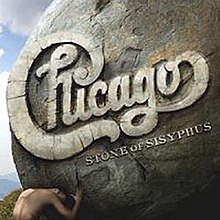Stone of Sisyphus
| Stone of Sisyphus | ||||
|---|---|---|---|---|
 |
||||
| Studio album by Chicago | ||||
| Released | June 17, 2008 | |||
| Recorded | 1993 | |||
| Genre | Rock | |||
| Label | Rhino Records | |||
| Producer | Peter Wolf | |||
| Chicago chronology | ||||
|
||||
| Singles from Chicago XXXII: Stone of Sisyphus | ||||
|
||||
| Professional ratings | |
|---|---|
| Review scores | |
| Source | Rating |
| Allmusic | |
| DailyVault | (B+) |
| Glide Magazine | |
| Stomp and Stammer | (mixed) |
Chicago XXXII: Stone of Sisyphus is the twenty-first studio album, and thirty-second overall, by Chicago. Often referred to as their "lost" album, it was recorded in 1993 and originally intended to be released as Stone of Sisyphus on March 22, 1994, as their eighteenth studio album and twenty-second total album. However, the album was unexpectedly and controversially rejected by the record company, which reportedly contributed to Chicago's later decision to leave their services entirely. Even after the band eventually acquired rights over their catalog, the album remained unreleased until June 17, 2008, after a delay of fourteen years and ten more albums.
With the releases of Chicago 18, Chicago 19, and Twenty 1, the band with its new generation of members would accomplish what vocalist and bassist Jason Scheff described as a "new legacy" for the 1990s. The next album, initially assumed to be called Chicago XXII, was conceived out of a desire to rediscover the band's personal, musical, and cultural roots, as an entity existing apart from its ultimately commercially marketed trappings. Scheff reflected, "In a sense, it was the beginning of that spirit ... of making music for the right reasons."
Concluding their recent album series with producers David Foster, Chas Sandford, and Ron Nevison, the band reapproached Peter Wolf to be the producer of the album. Having already declined the band's employ in the distant past due to scheduling issues, he now accommodated. He admonished them, "Don't try to write a hit. ... You have to have your love in mind, and a hit record might happen." Scheff later reflected that Sisyphus "was our statement ... taking all the motives away from [the idea that], 'I've got to make a hit; I've got to use outside writers' material'".Walter Parazaider called it "a record that had to be made."
Thus, against the distant backdrop of wildfires in and around Los Angeles, collaboration ensued at the residential studio of producer Peter Wolf.
The musical content of Stone of Sisyphus was reportedly developed in "complete secrecy" from the entire outside world including the record label, in order to emphasize the band's creative sovereignty.
"Sleeping in the Middle of the Bed" was one of the album's more uniquely styled and potentially commercially controversial tracks. Containing themes of early hip-hop and chants, it was inspired by the 1960s' precursors of rap music, as taken from the band's listening sessions of composer Robert Lamm's personal collection of old records by The Last Poets. "Bigger Than Elvis" is an unusually personal ballad, nostalgically recalling Jason Scheff's childhood adulation and heartsickness resulting from his father Jerry Scheff's traveling career as Elvis Presley's bassist, as had been canonized in the television broadcast of Aloha from Hawaii Via Satellite. Peter Wolf and his wife Ina heard Scheff's stories and coauthored the song. As a surprise to his father, Jason Scheff solicited his father's isolated bass guitar performance for the clandestine track, later revealing the true purpose of the completed song as a gift.
...
Wikipedia
